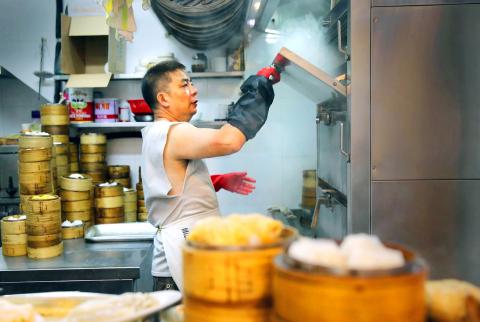For the past 60 years, Chui Hoi has risen in the early hours of the morning to prepare bite-size steamed morsels for his small, but popular dim sum restaurant in Hong Kong.
Sun Hing restaurant opens its doors at 3am, seven days a week, with a loyal clientele from students to the elderly filling the 60-seat restaurant in the western district of Kennedy Town.
At 85 years old, Chui is committed to handmaking his dim sum — parcels of meat, seafood and sweet fillings served in stacks of bamboo baskets — saying that freshness is key to their success.

Photo: AFP
However, many in the industry fear the traditional art of making dim sum is dying as restaurants choose factory-made versions to save money and meet demand.
“Fresh handmade foods are beautiful after they are steamed, but many are made in factories now,” Chui said.
Younger chefs are less interested in the hard graft it takes to prepare dim sum, he added.

Photo: AFP
As dim sum is usually eaten in the morning, cooks must get up in the night to prepare.
“Young people think being in this industry means no freedom because you have to get up early and the hours are long,” he said.
At Maxim’s Palace in the harborfront City Hall building — a favorite with locals and tourists — chandeliers sparkle over dim sum diners in the buzzing banqueting hall.
However, like Chui, Maxim’s supervising chef Tang Leung-hung says there is a dearth of young talent to produce its handmade fare.
“The problem with the industry is the manpower. Young people are not willing to join us,” he said.
“Many of them have turned to hotels’ Western restaurants and sushi restaurants for jobs instead of Chinese ones,” Tang said, with younger people seeing them as more fashionable and with better hours.
Dim sum is a Cantonese-style cuisine from southern China, often served with pots of tea.
Typical dishes vary from parcels of ground pork and shrimp siu mai (燒賣) to sweet treats, including custard buns and ma lai go (馬來糕) steamed sponge cake.
Once mainly part of a leisurely weekend ritual that could take hours, many dim sum joints in Hong Kong now have a quickfire approach, including take-away kiosks inside subway stations.
With demand growing and rental costs high, mass-produced buns and dumplings imported from the mainland are a way to up the volume and cut costs.
However, there are those who are actively seeking to prevent a culinary art from dying out. In the kitchen of Hong Kong’s famous five-star Peninsula hotel, teenagers don chefs’ whites to knead dough and fill intricate parcels as part of a cooking contest.
“We need to attract youngsters to join this trade. Craftsmanship is what is needed,” said Frankie Tang, executive chef of the Penisula’s Spring Moon Restaurant and organizer of the contest.
Of the five finalists making dim sum from scratch, 17-year-old Wu Cheng-long won after making dishes including crunchy lotus-seed pastry and a spring roll filled with fruit.
“We should make people not forget [how to make] dim sum. We should continue to develop this tradition,” said Wu, who won HK$25,000 (US$3,200) cash and a one-year apprenticeship at the hotel.
There is also hope among the territory’s food experts, who say dim sum’s enduring popularity at home and increasing appeal abroad will inspire young chefs.
Several of the city’s local dim sum restaurants have received international accolades, including Michelin stars.
“The tradition [of eating dim sum] is still thriving... On Father’s Day, for example, you don’t go to a Western fast-food restaurant, you go to yum cha (飲茶),’” Hong Kong food blogger KC Koo said.
Yum cha — Cantonese for “drink tea” — is the name for the meal during which dim sum are eaten, washed down by hot tea.
Koo adds that it is important to preserve the handmade tradition as it is a key facet of Cantonese culture.
“I have confidence that there will be new blood as the market is there,” he said.
Back at Sun Hing, the elder Chui’s 48-year-old son Chui Kwok-hing is following in his father’s footsteps.
“I come in at 1:30am. Sometimes I feel like I have migrated to another country as the hours are upside down,” he said of the exhausting routine.
However, he sees a reason for waking up in the dark.
“People like to have dim sum in the morning, to be energized with some tea before going to work,” he said.
“I feel happy when people think the food is delicious,” he said.
He added that he wants to preserve the restaurant’s hard-won reputation.
“My dad is already 85 years old, but he still works here — as the young generation, we should try to be even better,” he said.

With an approval rating of just two percent, Peruvian President Dina Boluarte might be the world’s most unpopular leader, according to pollsters. Protests greeted her rise to power 29 months ago, and have marked her entire term — joined by assorted scandals, investigations, controversies and a surge in gang violence. The 63-year-old is the target of a dozen probes, including for her alleged failure to declare gifts of luxury jewels and watches, a scandal inevitably dubbed “Rolexgate.” She is also under the microscope for a two-week undeclared absence for nose surgery — which she insists was medical, not cosmetic — and is

CAUTIOUS RECOVERY: While the manufacturing sector returned to growth amid the US-China trade truce, firms remain wary as uncertainty clouds the outlook, the CIER said The local manufacturing sector returned to expansion last month, as the official purchasing managers’ index (PMI) rose 2.1 points to 51.0, driven by a temporary easing in US-China trade tensions, the Chung-Hua Institution for Economic Research (CIER, 中華經濟研究院) said yesterday. The PMI gauges the health of the manufacturing industry, with readings above 50 indicating expansion and those below 50 signaling contraction. “Firms are not as pessimistic as they were in April, but they remain far from optimistic,” CIER president Lien Hsien-ming (連賢明) said at a news conference. The full impact of US tariff decisions is unlikely to become clear until later this month

GROWING CONCERN: Some senior Trump administration officials opposed the UAE expansion over fears that another TSMC project could jeopardize its US investment Taiwan Semiconductor Manufacturing Co (TSMC, 台積電) is evaluating building an advanced production facility in the United Arab Emirates (UAE) and has discussed the possibility with officials in US President Donald Trump’s administration, people familiar with the matter said, in a potentially major bet on the Middle East that would only come to fruition with Washington’s approval. The company has had multiple meetings in the past few months with US Special Envoy to the Middle East Steve Witkoff and officials from MGX, an influential investment vehicle overseen by the UAE president’s brother, the people said. The conversations are a continuation of talks that

CHIP DUTIES: TSMC said it voiced its concerns to Washington about tariffs, telling the US commerce department that it wants ‘fair treatment’ to protect its competitiveness Taiwan Semiconductor Manufacturing Co (TSMC, 台積電) yesterday reiterated robust business prospects for this year as strong artificial intelligence (AI) chip demand from Nvidia Corp and other customers would absorb the impacts of US tariffs. “The impact of tariffs would be indirect, as the custom tax is the importers’ responsibility, not the exporters,” TSMC chairman and chief executive officer C.C. Wei (魏哲家) said at the chipmaker’s annual shareholders’ meeting in Hsinchu City. TSMC’s business could be affected if people become reluctant to buy electronics due to inflated prices, Wei said. In addition, the chipmaker has voiced its concern to the US Department of Commerce